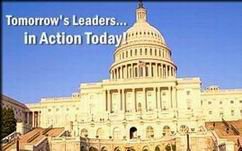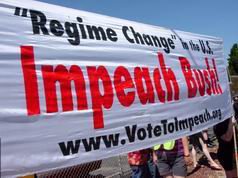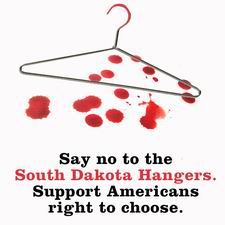By
TED KOPPELThe American people ... know the difference between honest critics who question the way the war is being prosecuted and partisan critics who claim that we acted in Iraq because of oil, or because of Israel, or because we misled the American people.
— President Bush, Jan. 10
Let us, as lawyers say, stipulate that the Bush administration was genuinely concerned that weapons of mass destruction, which they firmly believed to be in Saddam Hussein's arsenal, might be shared with the same Qaeda leadership that planned the horrific events of 9/11. That would have been a reasonable motive for invading Iraq; but surely now, three years later, when the existence of those weapons is no longer an issue, it would be insufficient reason for the United States to remain there.
Let us further acknowledge that continuing to put American lives at risk in Iraq purely for the protection of Israel would arouse, in some quarters, anti-Semitic murmurs, if not growls.
But the Bush administration's touchiness about charges that we acted — and are still acting — in Iraq "because of oil"? Now that's curious. Keeping oil flowing out of the Persian Gulf and through the Strait of Hormuz has been bedrock American foreign policy for more than a half-century.
Fifty-three years ago, British and American intelligence officers conspired to help bring about the overthrow of Iran's prime minister, Mohammed Mossadegh. Mossadegh's shortcomings, in the eyes of Whitehall and the State Department, were an unseemly affinity for the Tudeh Party (the Iranian Communists) and his plans to nationalize the Iranian oil industry. The prospect of the British oil industry being forced to give way to Soviet influence over the Iranian oil spigot called for drastic action. Following a military coup, Mossadegh was arrested, imprisoned for three years and then held under house arrest until his death in 1967. Power was then effectively concentrated in the hands of Shah Mohammed Reza Pahlavi.
The shah's unswerving commitment to the free flow and marketing of Iranian oil would, by the end of the 1960's, become a central pillar of the so-called Nixon Doctrine, in which American allies were tapped to be regional surrogates to maintain peace and security. The sales of sophisticated American weapons to Iran served the twin purposes of sopping up billions of what came to be known as "petro-dollars," while equipping (in particular) the shah's air force.
That reliance on Iran to maintain stability in the Persian Gulf enjoyed bipartisan support. On New Year's Eve in 1977, President Jimmy Carter, visiting the shah in Tehran, toasted his great leadership, which he said had made Iran "an island of stability in one of the more troubled areas in the world." By January 1980, after Ayatollah Ruhollah Khomeini had driven the shah from the Peacock Throne, President Carter made absolutely clear in his final State of the Union address that one aspect of our foreign policy remained unchanged:
"An attempt by any outside force to gain control of the Persian Gulf region will be regarded as an assault on the vital interests of the United States of America, and such an assault will be repelled by any means necessary, including military force."
The Reagan administration announced its intention to continue defending the free flow of Middle East oil, by whatever means necessary. In March 1981, Defense Secretary Casper Weinberger clearly signaled that the United States was seeking a new base of operations in the Persian Gulf:
"We need some facilities and additional men and materiel there or nearby, to act as a deterrent to any Soviet hopes of seizing the oil fields or interdicting the line."
Subsequently, the United States began establishing military bases in Saudi Arabia and, to much criticism, selling Awacs aircraft to the Saudi government. In 1990, when Saddam Hussein appeared likely to follow his invasion of Kuwait by crossing into Saudi Arabia, the defense secretary at the time, Dick Cheney, laid out Washington's concerns:
"We're there because the fact of the matter is that part of the world controls the world supply of oil, and whoever controls the supply of oil, especially if it were a man like Saddam Hussein, with a large army and sophisticated weapons, would have a stranglehold on the American economy and on — indeed on the world economy."
What Mr. Cheney said was correct then and remains correct now. The world's oil producers pump approximately 80 million barrels a day. The world's oil consumers, joined today by an increasingly oil-hungry India and China, purchase 80 million barrels a day. Were production from the Persian Gulf to be disrupted because of civil war in Iraq, the freezing of Iranian sales or political instability in Saudi Arabia, the global supply would be diminished. The impact on the American economy and, indeed, on the world economy would be as devastating today as in 1990.
If those considerations did not enter into the Bush administration's calculations when the president ordered the invasion of Iraq in 2003, it would have been the first time in more than 50 years that the uninterrupted flow of Persian Gulf oil was not a central element of American foreign policy.
That is not to say that the United States invaded Iraq to take over its oil supply. But the construction of American military bases inside Iraq, bases that can be maintained long after the bulk of our military forces are ultimately withdrawn, will serve to replace the bases that the United States has lost in Saudi Arabia. There may be other national security reasons that the United States cannot now precipitously withdraw its forces from Iraq, including the danger that the country would become a regional terrorist base; but none is greater than forestalling the ensuing power vacuum and regional instability, and the impact this would have on oil production.
H. L. Mencken is said to have noted that "when someone says it's not about the money — it's about the money." Arguing in support of his fellow Arkansan during Bill Clinton's impeachment trial, former Senator Dale Bumpers offered a variation on that theme: "When someone says it's not about the sex — it's about the sex."
Perhaps the day will come when the United States is no longer addicted to imported oil; but that day is still many years off. For now, the reason for America's rapt attention to the security of the Persian Gulf is what it has always been. It's about the oil.
Ted Koppel Bush Cheney Empire Oil Iraq War Koppel





















